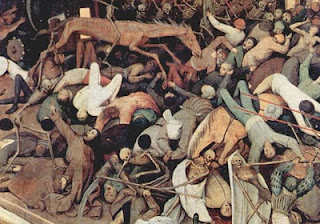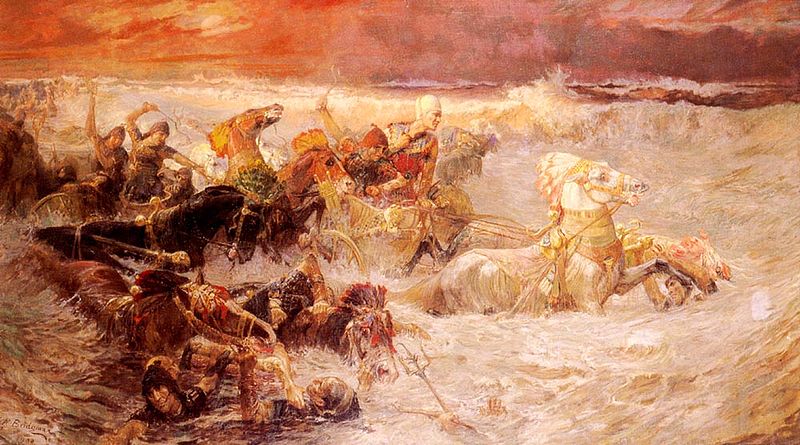
Our Islamic Arab nation possesses a number of myths which occupy a position of sanctity – myths such as the beard, the niqāb and the turban, and so on. But the strangest of all of these is the punishment of the grave, for this has come to take on such an importance as to become part of the Muslim confession of faith.
AND THIS DESPITE the fact that the Muslim’s belief – as stipulated by the Prophet – is faith in God and His Angels and His Books, faith in His Messengers, in Fate and in the Final Day, we find that as a result of centuries of decline and ages of ignorance the ‘Punishment of the Grave[1]’ has been added to this list. This error exercised the intellect and the “upheaval” of Ibn Taymiyya who in his work al-ʽAqīda al-Wāsitiyya says:
Part of the faith in the final day is belief in everything that the Prophet reported on that which shall be after death, so that Muslims are to believe in the trial-ordeal of the grave, in its torments and its divine beneficences. As for the trial-ordeal, people shall be questioned in their graves and asked: who is thy Lord? What is thy faith? Who is thy Prophet? For Allah confirmeth those who believe by a firm saying in the life of the world and in the Hereafter.[2] And the believer shall say: “Allah is my Lord, Islam is my faith, Muhammad is my Prophet”. But the doubter will say: “Er, Ah, I do not know, I heard people saying something and so I said it too”. Whereupon he shall be struck with an iron rod and will cry out so loud that all beings but humankind alone will hear his screams, for were humankind to hear them they would faint from terror. Then after this trial-ordeal, there will be the recompense of disbelief or the grace of God, until the great Day of Resurrection when all souls shall be restored to their bodies.
Signs of the problem we are facing are all over the above passage, which is intended to maximise its impression and stir up fear and terror in the hearts of men. Ibn Taymiyya was especially taken with this hadith since he adopts the rule that Imām Ahmad ibn Hanbal laid down whereby a weak hadith is preferable to an analogy. This ominous principle permitted the acceptance wholesale of hadith that provide support to the Salaf, and led to a torrent of weak, fabricated hadith concerning the Salaf, among which features the hadith on the test-ordeal of the grave. For we see in Bukhari’s hadith no. 1239 the following statement:
‘Abdān reports: my father told me that Shaʽba heard from Al-Ashʽath that his father heard from Masrūq, who in turn heard from ʽĀ’isha, that at a Jewish woman came to visit her and told her about the punishment of the grave. She said “May God protect you from the punishment of the grave” and ʽĀ’isha went on to ask the Prophet of God concerning the punishment of the grave and he answered: “Yes the punishment of the grave is true”. And ʽĀ’isha said: “and I never saw the Prophet of God finishing his prayer without asking God to grant him refuge from the punishment of the grave.”
This hadith is one of the worst examples of fabricated hadith, since in addition to its fabrication it gives the impression that the Prophet knew nothing of the punishment of the grave until he was alerted to them by this Jewish woman, whereupon ʽĀ’isha is then to have said: “I never saw the Prophet of God finishing his prayer without asking God’s refuge from the punishment of the grave.” Similarly, it is reported by Abū Hurayra that
the Prophet of God used to pray: “Oh God I take refuge in Thee from the punishment of the grave and from the torment of Hellfire and from the trial of the Antichrist” (a hadīth reported by both Bukhārī and Muslim).
And here we can notice that the Prophet of God in his invocation preferred the term ‘torment of Hellfire’ over against ‘punishment of the grave’. Now this preference indicates a contrast, in the sense that the punishment of the grave is not the same as the torment of Hellfire in the afterlife. Ibn ʽAbbās reports that the Prophet used to teach them this prayer when instructing a verse of the Qur’ān:
“Oh God in Thee I take refuge from the torment of Jahannum and in Thee we take refuge from the punishment of the grave and from the ordeal of the Antichrist, and we take refuge in Thee from the ordeal of life and death” (a hadith reported by Muslim).
There are more than nine separate transmissions of this hadith, in addition to other ‘sound’ hadith. Did the Prophet take refuge in God from a punishment that doesn’t exist? And to those who say that what is meant by the punishment of the grave is the torment of Hellfire in the afterlife, we say that this is not so since the Prophet indicated a preference for one term over the other, and this preference therefore indicates that they are being contrasted.
Anyone peddling these tales should be arrested and an example made of them
Imām al-Qastillānī in his work Irshād al-Sārī Sharh Sahīh al-Bukhārī (vol.II, p.460) writes the following:
The number of hadith on the punishment of the grave have multiplied to the point that more than one scholar has declared them to be mutawātir[3] and authoritative, and moreover that if something like this is to be considered not true then nothing about the faith can be considered true.
The author of the Sharh al-ʽAqīda al-Tahāwiyya[4] states that:
The hadith of the Prophet of God are authoritative concerning the proven nature of the punishment or the comfort of the grave for those who merit such, and concerning the interrogation by the two angels and it therefore behoves one to accept the proof of this and to believe in it.
As evidence we need only turn to the work The Confirmation of the Punishment of the Grave by al-Bayhaqī who cites 240 hadith on this including 73 hadith reported by Bukhārī and Muslim. The number of Companions recording these hadith totals 39, and the report by al-Bayhaqī in his work does not feature all of the hadith but simply most of them. For in the Sahīh of Bukhārī there are close on 100 hadith on the punishment or beneficence of the grave and on the life of Barzakh.[5] There in the grave the deceased harkens and sees either comfort in the grave, or torment, with his grave either narrowed or expanded for him. In the Sahīh of Muslim the number of hadith are about the same number or slightly more, so with over 200 hadith in the Sahīh collections of Muslim and Bukhārī adduced specifically on this matter – in addition to what are adduced in other works of reliable hadith – are we to say that the hadith on the punishment of the grave are transmitted by a single narrator and therefore weak?
Al-Hāfiz ibn al-Salāh and Ibn Hajar and Ibn Kathīr stated that if Bukhārī and Muslim concur on a hadith then it attains to a decisive, scientific status of certitude, as if it were a mutawātir hadith. The reason for this is that the Nation is in awe of these two works and, as they say, “the Nation cannot concur on an error.” Yet these yarns should not intimidate us since the writings of those who wish to exploit Islam in a malicious manner or induce men to submit to everything they say, can only make use of constant repetition. How can they be harmed while the door of deception remains wide open and all they need do is cite the names of the Companions? For those who wish to destroy Islam and sharpen religious sensibilities find no basis on which to bring their plans to fruition. We saw in the previous paragraph that it is only through repetition that they see evidence for the soundness of their positions.
Freeing the mind from belief in the occult is a prerequisite of Islam
When I understood that the Sunna was the open door to those who wished to deal with Muslims in a malicious fashion and that there was no authority to most of these hadith, (but rather that the precedent is valid only if they contain something of the Qur’ān, in that this is more reliable), and on hearing it said that the end of verse 46 in sūrat Ghāfir of the Qur’ān indeed contains this[6], I checked it with the most eminent of the commentators al-Tabarī. I found that there was no mention of the trial-ordeal of the grave whereby a man is asked concerning who his Lord was, what his religion was or who his Prophet was, and that if he answered wrongly he would be struck with an iron bar and cry out so loud that all but humankind would hear his screams. The same applies regarding the house of Pharaoh, in that the meaning is not something to be applied on a general basis but is rather restricted to the people of Pharaoh. As al-Tabarī writes:
As for the interpretation of the Almighty’s words: The Fire; they are exposed to it morning and evening; and on the day when the Hour upriseth (it is said): Cause Pharaoh’s folk to enter the most awful doom, the Almighty intends to demonstrate clearly the grievousness of the punishment that befalls these Pharaonic villains: that dreadful doom that encompassed Pharaoh’s folk, The Fire; they are exposed to it.[7] And that when they perished when God caused the water to drown them, their souls were placed in the bellies of black birds, and exposed to the inferno twice a day morning and evening until the coming of the Final Hour. The one averring this statement recalls that it was related by Muhammad ibn Bashshār from ‘Abd al-Rahmān, who in turn recalls it as being from Sufyān from Abū Qays, and in turn from al-Hudhayl ibn Sharhabīl who is to have said: “the souls of the house of Pharaoh have ended up in the bellies of black birds and are destined for Hellfire, and this is what they are exposed to.” This Muhammad relates that he had heard it from Ahmad who said that Asbāt related the following from al-Sudayy: “I hear that the souls of the people of Pharaoh are in the bellies of black birds and exposed to Hellfire morning and evening until the coming of The Hour.”
Similarly, ‘Abd al-Karīm ibn Abī ‘Umayr reports the words of Hammād ibn Muhammad al-Fazārī al-Balkhī:
“I heard al-Awzāʽī say, in answer to one who questioned him on this: “We saw white birds issuing from the sea heading west in droves – only God knows the number of them – yet when evening came the same number returned, but black in colour.” “And did you understand the significance of this?” he asked. “Yes,” was the reply. “These birds,” he explained, “are in essence the souls of the House of Pharaoh exposed to the inferno day and night, after which they return to their nests with their feathers burnt and blackened. Overnight new white feathers grow over them again, speckling the black, until they are again exposed to the inferno day and night, and then once again return to their nests. This they continue to do all the days of their life on earth until the Day of Resurrection comes when God says: Cause Pharaoh’s folk to enter the most awful doom.’ “And it is said that they totalled 600,000 soldiers in all.”

Suggested Reading
The truth of the matter is that it is not a question of whether any particular hadith exists or not, or whether there is any indication of it in the Qur’ān, or even a complete chain of transmission to provide evidence for it. It is simply that these tales have to be rejected outright on grounds both of reliability and of the intellect. Just as their association with God – a symbol of mercy – acts only to defame Him and are therefore to be rejected. Is it reasonable that the punishment for a Muslim’s hesitation or ignorance should be that he be beaten with an iron bar? If a generation is brought up on these tall tales it can only turn into one that is fearful and cowardly, a generation devoid of either sense or courage. Indeed anyone peddling these tales should be arrested and an example made of them. A punishment should be stipulated for those that tamper with religion and mock it like this and compromise the Divinity, until this type of talk is rooted out lest this myth persists, flourishes and becomes sacralised.
For it is the transplanting of the critical, thinking, prudent mind with a mentality of blind repetition that lies at the heart of the conspiracy against Islam. It establishes in Muslims a mentality of occultism, one that makes them believe every nonsensical falsehood and corrupts their capacity for thinking and criticism. This way the nation will be led around like herds of cattle, unable to answer back and unable to escape. Freeing the mind from belief in the occult is a prerequisite of Islam, which holds that God alone knows what is unseen, an Islam whose Prophet clearly stated: “I know nothing of the Unseen.” What then is this parasitism and claims made to a knowledge of everything that comes after death? We would be better advised to focus our minds upon pondering the challenges of the modern age – for otherwise why would Westerners say about us that “Muslims think about nothing else than their future beyond the grave”?
[1] This is the period following death but prior to the Day of Judgement, and where the souls of the unrighteous are punished in the grave. The Qur’ān does not refer to this Punishment of the Grave but instead it is mentioned in the hadith. (Ed.)
[2] [Qur’ān XIV,27].
[3] A hadith of which the narrators constitute a group or large number, on the understanding that it is considered impossible for them all to agree to transmit a lie. (Ed.)
[4] Shaykh Sālih ibn ʽAbd al-ʽAzīz Āl al-Shaykh, Saudi Minister for Islamic Affairs, Awqāf, Daʽwā and Guidance and a descendent of Muhammad ibn ʽAbd al-Wahhāb, the founder of the Wahhabist school. (Ed.)
[5] The intermediate state in which the soul of the deceased is transferred across the boundaries of the mortal realm to a state where the soul will rest until the Day of Judgement. The term appears in Qur’ān XXIII,100. (Ed.)
[6] [Qur’ān XL,46]: ‘On the day when the Hour upriseth (it is said): Cause Pharaoh’s folk to enter the most awful doom’.
[7] [Qur’ān XL,45-46].
Main image: The torment of Hellfire in the afterlife, as seen by the Dutch painter Pieter Breugel the Elder, c.1525-1569

